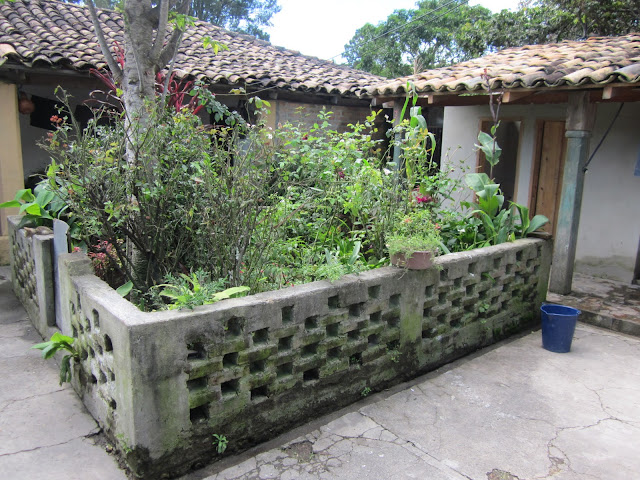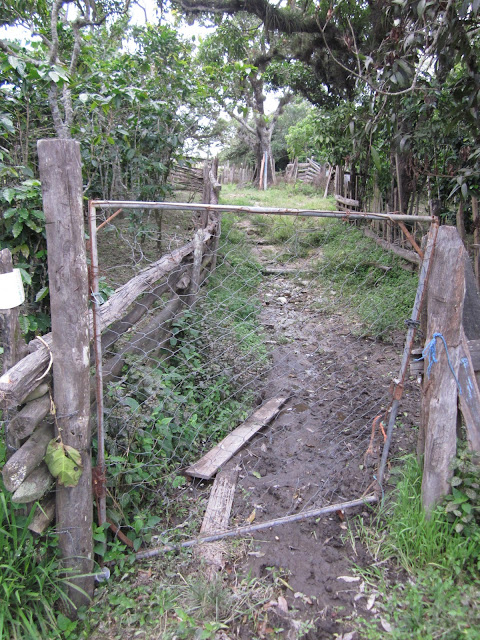On Saturday, some of the International School Tegucigalpa gals and I embarked on a bumpy car ride to Manzaragua, a villiage located a few hours south of the city. One of our fellow teachers, Blanca, is a native Honduran who grew up in Manzaragua. She occasionally delivers supplies to families there. In the last few weeks, Blanca's villiage has received large amounts of rainfall. At one point, it rained for 12 days straight, destroying the livelihood of many families and stranding other families in their homes. They survive now on what is left and what is given.
The village of Manzaragua is situated high up in the mountains, more so than Valle. We took a pick-up truck packed with all five of us and our things.The supplies we laid in the paila, or bed, of the truck: clothes, beans, rice, flour, water, laundry soap, etc. The ride proved rough because only dirt roads reach this remote villiage and are therefore subject to rain, buses, and pack animals. Luckily, the previous few days were dry. Blanca explained that when rains fall on the roads, dirt converts to mud and the cars “dance” along at a dismal pace.
As it were, the ride lasted two hours, most of which was spent curving around green mountains and looking down into the abyss.
In Honduras, school buses constitute much of the public transportation. However, for a North American like me, it's safer to call a trusty taxi or, ironically, a public van. However, the type of transportation below is the only type allotted to isolated villages like Manzaragua. Every bus that passes here is full to the brim with passengers, both sitting and standing.
Just for good measure, a picture of the lovely ladies Sarah, Kayla, and I happy to be on our adventure.
On the way we witnessed a number of Hondurans loading supplies onto donkeys. Many folks ride the bus to the city for supplies. Upon return, they arrange to meet with a spouse or a family member who brings a donkey to transport the cargo for the rest of the journey back to their village. Blanca described how, due to lack of cell phones, she'll hear a message on the local radio such as, “So-and-so will be at this stop at this time and she needs her husband, So-and-so, to meet her there with two donkeys.”
Once in Manzaragua, we stayed at Blanca's mother's house. Blanca grew up in a beautiful house/hacienda/ranch with an open patio garden and lot of animals hanging about.
Inside the house grounds:
Animals walking about:
My new love.
Mid-neigh.
All by myself.
Friends are friends forever.
Pretty sure this guy and his bug-eyed friends woke me up in the morning. I felt like I was in a Looney Tunes cartoon.
As soon as we settled in, we organized our supplies and headed out. Many of the families were very shy, not used to receiving visitors. One woman had just lost her husband several weeks prior. He was an invalid for years, unable to use his legs. She took care of him till the end of his life, helping him maneuver around their adobe house. This type of dwelling, Blanca insists, is a real Honduran home.
In most cases, we arrived at a house to find piles of ruined food and rows of drowned vegetables. In another house, a man suffered from alcohol abuse. He and his wife were unable to leave their house for twelve days while the rain detroyed the plants he uses for making brooms to sell. Before we left, Blanca prayed over him and his house while he wept silently. The next day, he traveled to Blanca's house to give us three of his homemade brooms. We purchased them with glee.

In one of the last houses we visited, an elderly man allowed me to take a picture of him.
And his baby chickens.
This is the view from his window.
When we left his house, his daughter gave us all kinds of vegetables including squash and potatoes.
Lucky for us, we needed to hike most of the houses we could not reach them by vehicle.



According to Blanca, some houses are so remote that their owners have installed ladders into the mountainside. Dwellers of these houses have to either ascend or descend the ladder to get to and from their house or even their villiage. We did not have to brave such ladders. Although, we did cross a river or two:



According to Blanca, some houses are so remote that their owners have installed ladders into the mountainside. Dwellers of these houses have to either ascend or descend the ladder to get to and from their house or even their villiage. We did not have to brave such ladders. Although, we did cross a river or two:
On our hike back to the river, we naturally spent time skipping stones. Blanca (far left) is a pro!
We caught a glimpse of a beautiful sunset.
My favorite part of the trip occurred when Blanca graciously led us on a hike to her father's land. He passed away two months ago and this hike proved especially difficult for Blanca. She mentioned that this was the first time she saw this landscape without him, and explained, with great pride, that her father was both ambitious and generous. On one hand, he own cattle, pigs, horses, and chicken. He bought acres of land, grew onions and corn, harvested coffee beans, and owned a pulpería, a store that sells a variety of supplies. At the same time, not a single family we served failed to mention his giving spirit. One man told us that every time he visited Blanca's father, he received a glass of milk. Hundreds arrived to pay their respects upon his passing.
Some pictures of his land.
While there, Blanca's brother insisted that we each gathered an ear of corn to take with us. When we returned to Blanca's house, we put the corn in the clay wood-burning stove to cook. Below is the stove. We laid the ears in an opening where the silver pot is in this picture.
While we stayed with Blanca's family, her mother and her sister-in-law prepared our delicious meals. We devoured a soup with tender beef and spiced potatoes, squash, and carrots. We enjoyed a breakfast of freshly cooked beans, eggs, and fried plátanos along with avocado covered in quesillo (a sour cream-like cheese sauce). All of our meals were served with fresh, homemade tortillas. In between meals, we snacked on fire-roasted corn cobs and home-squeezed orange-ish juice. In fact, this juice was so delectable we bought bottles of it from Blanca's sister-in-law to take home to Tegucigalpa. Sarah and I from the yellow house had a discussion about how much we were willing to share with our roommates.
Miscellaneous:

I admit to having a special love for this kitten. That face!
Sarah reading the Spanish version of If You Take a Mouse to School to Andrea.
For fun, I took videos. I have named them for reference. Apologies for the odd spaces in between the videos. Blog is being a ding-dong.
Cat on a Small Stone Fence
Cat on a Small Stone Fence
Cat Fight with Pauses
Andrea Learns Ballet
Hope you experienced a bit of Manzaragua. Next adventure? A bona-fide Honduran wedding this weekend!













































that's my father's old town very long time since I went there... that was your first time there?
ReplyDelete